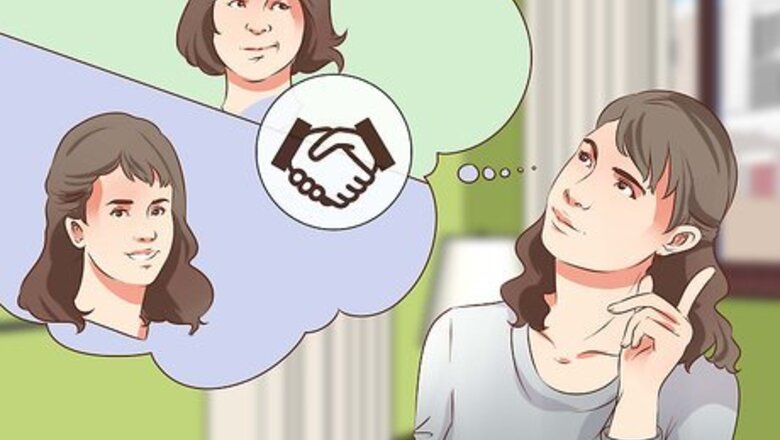
views
Understanding the State of Your Friendship
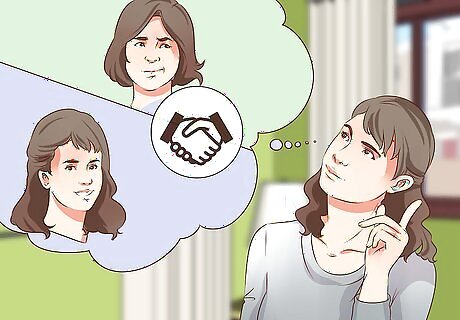
Think about your friend’s values and compare them with yours. Discovering that your friends share different values than you doesn’t require that you cease your friendship, but having common ground is certainly a good way to build a friendship. A friend who does not share the same truths or point of view that we do can be difficult to empathize with. To consider how you and your friend’s values correspond (or don’t), make a list of each of your perspectives on a variety of important subjects, including: Political alignment Religious beliefs Views on women’s rights and reproductive health Views on recreational drug use Emphasis on acquiring material goods and money Being active when seeking and choosing friends is an important part of learning to select friends who are good for you. If you wait for your friends to select you, you may find you have little in common with them. Evaluate the results of your analysis. If you have lots of things in common and you two get along great, then you probably have a great friend who would do anything for you. If your results show a high proportion of mismatched attitudes and interests --you’re a vegetarian, he or she is a hunter; you’re liberal and she or he is conservative -- you may have a hard time maintaining a friendship with that individual. Mismatched interests and attitudes do not necessarily preclude friendship. Ask yourself: Do you truthfully enjoy spending time with this person? Do they enrich your life and experiences? Be honest with yourself. If you don't enjoy being with the other person, especially due to their divergent values, the friendship might not be worth it.

Think about the last time you just sat down and talked. Did you feel invigorated and refreshed by your conversation? Or were you worn out and tired of talking with them by the end? If a long time has passed since you had a good talk with your friend, you might be drifting apart. Do not expect someone who was your friend at one stage of your life to remain your friend throughout your entire life. As people age, friends change due to a variety of circumstances including occupations, geography, and familial commitments. Accepting that your roster of friends will rotate is an important step towards a healthy personal life. The passage of time alone need not be grounds for ending a friendship. Friends often remain so for many years despite growing older, changing careers, or moving across the country. Email and social media make keeping a friendship alive easy despite the march of time. Don’t feel obligated to remain friends with someone simply because they have been your friend for a long time. “Zombie friendships” which continue long past their expiration date are a waste of time for both of you. Instead of reminiscing about days gone by with someone you stopped really being friends with years ago, spend your time with your real friends who are engaged and involved in your life as it is today.

Ask if you value the time you spend together. How often do you and your friend spend time with each other? Did you two start off talking all the time, and now you hardly ever speak? Do you find that making time for your friend is just not as important as it used to be? If so, it might mean your friendship may be coming to a close. It may be that one or both of you are getting too busy to keep up with each other, and have other obligations which demand your attention. People sometimes move in different directions. Learning to let friends go is a difficult but necessary ability. There’s no need to excommunicate them; just gradually fade out from their life. Good friends make time for each other. If the person matters to you -- and if you matter to them -- you will find time for each other and the friendship will survive. If you are unsure about how much you value your friendship with this friend, try seeing less of him or her. If you usually see each other four days a week, try to see each other three days a week instead. If you’re comfortable with this level of contact, reduce the time you spend with your friend further. If you don’t value their companionship, you will not miss the time spent without them. However, if you value them, you will quickly feel the pangs of longing for the friend you’re seeing less frequently than you were before.
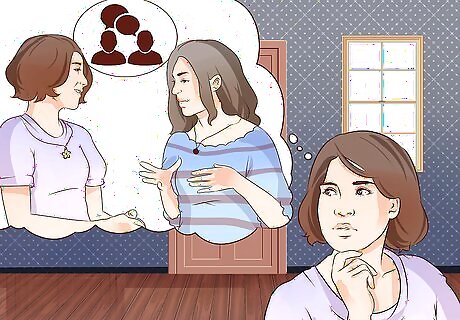
Think about how you and your friend communicate. If you and your friend communicate in different ways, you may not be compatible as friends. For instance, perhaps your friend finds vulgar language and offensive humor hilarious, while you do not. Since you and your friend have such different styles of communication, you can let go of this friend. Perhaps your friend is socially awkward. A socially awkward person might not ask you follow-up questions after you’ve described your feelings or your day, or not know when to leave a party or get-together. They might also stand, stare, or sit quietly. Socially awkward friend might not understand or empathize with your challenges and difficulties when you share them, and therefore, make for poor friends. Instead of ending your friendship with a socially awkward friend, you might try helping them along in the conversation. Coax reactions and affirmations of interest out of your friend by asking them questions directly about how your stories affect them or make them feel. Ask rhetorical questions such as “Isn’t that weird/interesting/sad?” where appropriate. Invite your friend to share a similar situation and model the behavior you’d like to see when communicating with them, such as reciprocity (“Yes, that reminds me of a similar situation...”), agreement, and acknowledgment (nod silently or say “Yeah,” “Uh-huh,” or “Wow!”). Try setting boundaries with your friend before cutting ties. Socially awkward individuals might not recognize when you want to be alone or want to spend time with other people. Be direct but sensitive when expressing that you do not wish to spend time with them. You might say “I’m sorry, but I don’t really feel like going out / hanging out tonight.” If your socially awkward friend is adamant, explain that sometimes you need your space and privacy. If they do not respect your decision and continue begging you to spend time with them, ending the friendship is the only choice. Another communication problem is frequent or deliberate misunderstanding. Some people enjoy causing conflict because it gives them a sense of power and purpose. Such an individual might twist your words to accuse you of something you have not done. For instance, if you mentioned that you’re really looking forward to going to Florida for the summer, a friend who does not possess adequate communicate skills might interpret this (deliberately or not) to mean you do not want to spend time with them over the summer.

Identify if your friend wants a romantic relationship. Sometimes your friends will want to be more than friends. Lots of healthy romances start out this way, but if it’s not something you’re interested in, you might have to extinguish the friendship. If your friend puts the moves on you, be honest and tell them how you feel. If the individual truly values your company and companionship, they will accept your decision and stop pursuing a romantic relationship with you. Sometimes your friend will not accept your decision to keep your friendship platonic. In this case, you will have little choice but to end the friendship. A friend who wants a romantic relationship could be someone you were in a romantic relationship before. Staying friends with your ex is difficult proposition. The chances that one or the other of you will want to rekindle the romance while the other does not can easily lead to hurt feelings on both sides. A possible exception to the rule against not being friends with your former lover exists when the passage of many years has allowed both of you to long ago move on.
Deciding if You’re Unappreciated

Identify if you are being disrespected. If your friend mistreats you or doesn’t show respect, letting that friend go is a good idea. For instance, perhaps he or she fails to take your concerns and problems seriously when you share them with him or her, or maybe they are kind in private but belittle you in front of others. Or, worse, they disparage you both publicly and privately. A lack of respect toward you might be indirect, aimed at your work or your partner. If your friend is constantly making negative comments about your wife or husband (“She’s not very bright” / “He’s not very good-looking”) you should reconsider having that person in your life. If you suspect your friend is talking badly about you behind your back, get as much information as you can. Who heard the comment? When and where did they hear it? If the source is reliable, you should take what they reported seriously. If more than one person overheard the comment, ask both separately what was said about you. If the reports about what was said correspond with each other, they are probably telling the truth. With this information in hand, confront your friend about what they said. If they deny it, give them the benefit of the doubt. For instance, perhaps Sam heard your friend Joe call you stupid. After asking Sam when and where he heard the comment, confront Joe about the situation. Ask him if he was at the place Sam recalled overhearing the statement about you, and if he saw Sam there. Finally, ask Joe if he said what was reported to you. If he admits to making the comment, you should seriously consider ending the friendship. Badmouthing a friend behind their back is not a sign of friendship. If you continually receive negative reports about things your friend said about you, it might be time to put an end to the friendship and stop believing their lies. Friends who disrespect you are not worth your time and energy.

Decide if your friend makes you feel as if you are not good enough. Does your friend constantly make you feel dumb? Are they critical of your point of view and unwilling to consider your opinions as valid? Do they persistently put you down for the way you do your hair or the clothes you wear? These are not qualities of a healthy friendship. If your friend does this, it is a clear sign your friendship is headed downhill. Your friend might make fun of your personal habits, such as how late you sleep, the foods you like to eat, or the clothes you wear. Your friend might make you feel bad due to your circumstances as well. If your friend criticizes your social class, your parents’ occupations, or the manner or size of your home, they are not acting in accordance with the demands of true friendship. Remember, always be yourself. Unless your behavior is hurting you or someone else, never change who you are just to satisfy someone else. A friend accepts you for who you are.
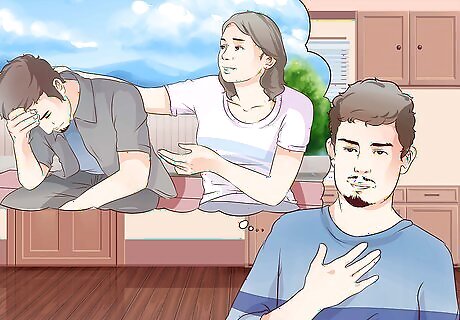
Decide if your friend makes you feel important. Narcissists make poor friends. If your friend tends to interrupt you when you’re sharing tales of woe or personal victories, it indicates they are uninterested in your life. Alternately, they might constantly one-up you, insisting that something even greater (or more terrible) happened to them. For example, you might be sharing a story about how you got high marks on your test and your friend retorts, “Oh, yeah? I got an A in that class and in chemistry, too!” A friend not worth having will feel obligated to steal the limelight whenever something good happens to you. A good friend always listens patiently to your problems, and offers advice when appropriate. They will not try to make themselves the center of every conversation or insert themselves into your stories. If your friend demonstrates a lack of empathy, understanding, or sensitivity to your life and concerns, they are not worth keeping. Do they listen to you carefully when you speak? Do they make eye contact? Do they ask follow up questions when you speak? If they do not, take their actions as an indication it is time to end the friendship.

Identify if your friend blows you off. If your friend is constantly breaking promises, or you have to beg them to spend time with you, the friendship is not on stable ground. For instance, if you both agree to go to the hockey game over the weekend, then at the last minute your friend cancels, it may be time to break off the friendship. When your friend does not reply to your calls, it is likely she or he is deliberately avoiding conversation with you. Your friend might also not reply to emails, letters, instant messages, or text messages. When your friend is bailing on you via text, you’ll know your friendship is basically at rock-bottom. Good friends confront each other directly with they know they are letting their friends down. Be on the lookout for lame excuses (“I had to feed my cat”) or half apologies (“If you had told me sooner, I would have come”). These are signs your friendship is not important to the other person.
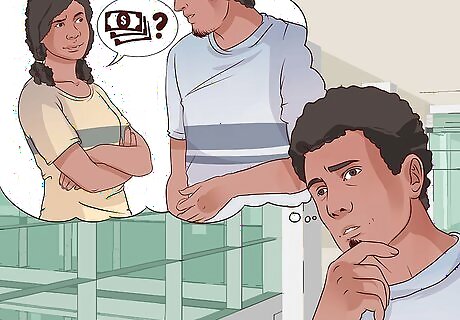
Decide if you’re being exploited by your friend. Does your friend only contact you when they want something? For instance, do they mooch off you for rides to work or school? Do they only act friendly when you loan them money or pay their way at the movies, restaurants, or other social situations? Are they too busy for you, except when they want you to put in a good word with your connection at the place they are applying for a job? If your friend feels no moral obligation to pay for themselves (and especially if they do not return your generosity when you need it), you are dealing with a moocher. Cut off all contact posthaste to protect your finances and sanity. If you don’t feel the problem warrants ending the friendship, at least learn to say no. Do not allow your friend to continue using you as a meal ticket. Be courteous but firm in your rejection of their requests. Friendship requires give and take. If you are constantly doing something for your friend and they are not doing anything for you, your friend is exploiting you. For instance, perhaps your friend expects you to treat them to the movies all the time, but they never treat you when you hang out. In this case, make your friend pay his or her own way in the future. If a friend insists that you pay because they have become accustomed to it, let them know that from now on you want to take financial responsibility for yourself, and you expect them to pay their own way. If they insist on knowing why, let them know that you feel it is unfair to pay for them all the time while they do not return the favor. If they are a good friend, they’ll see the error of their ways and amend their behavior. If they are not a friend worth keeping, they’ll react with accusations, blaming, and anger. Should the latter situation unfold, rid yourself of this friend as fast as possible.
Deciding if You Feel Fed Up

Host an intervention. If your friend is addicted to drugs or alcohol, they may need serious counseling. As a good friend, you want to support them in their fight against addiction but cutting ties in an act of “tough love” is often the only way to get them to wake up. An intervention is a serious event where the addict’s loved ones and friends gather to confront the individual in question about their unhealthy habits. The upshot of the intervention is an ultimatum that unless they sober up, they will have no-one left to turn to for friendship or financial aid, as you and the rest of their family and friends can no longer stand by and watch them self-destruct. Interventions are serious affairs and should be treated as such. Alternately, if your friend is a bad influence on you and encourages you to take up drugs and drink at the same rate they do, you should not continue to be friends with them. Such an individual is not looking out for your best interests. Ending a friendship with an addict who will not change is the best option to keep you healthy. A friend with a drinking problem can be a threat not themselves and others, but a burden as well. You may find yourself worrying about them, or embarrassed to be associated with them A friend like this should be let go to protect your own mental health and well-being.
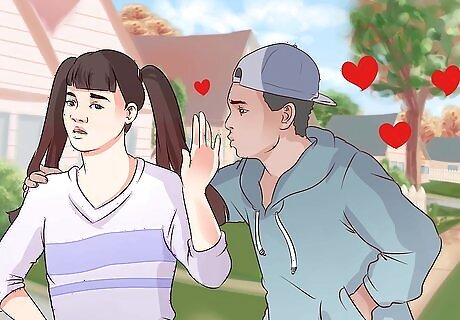
Decide if you are annoyed by your friend. Maybe your friend is irritating. He or she complains all the time. They are like a broken record about some (ever-changing) problem or fixation -- a new girlfriend or boyfriend, a “totally sweet” car they want, or a rotten boss at work. For instance, maybe your friend wants a “totally sweet ride,” and can’t tell that you aren’t interested in looking at yet another picture of it or hearing how fast it can go from zero to sixty. A few days later, they do the same thing -- with another model car. The cycle continues. Being friends with annoying people is hard work -- sometimes, too hard. Such a friend may not be worth the trouble and irritation they cause. Perhaps your friend calls or texts you nonstop. They do not care if you’re at work, school, or church, and no matter how much you ignore them, they continue to attempt contact. Your annoying friend might not have done anything major to earn your irritation. Some people just rub us the wrong way. If your friend is annoying because of the words they use (especially a repeated catchphrase or slogan), tone of voice, or way they act, they might not make good friends. You have every right to be honest with yourself about your feelings, and if you are annoyed or irritated by someone, limit contact with them.

Decide if your friend is trustworthy. Friends demonstrate their trustworthiness in a number of ways. A good friend will keep secrets you tell him or her safe. They will never lie to you, and always speak to you openly and honestly. Friends should not reveal information about you which they know or suspect would be embarrassing or shameful if made public. Joking with people who are not your friends about your personal struggles, phobias, or sources of anxiety are acts which no friend should engage in. If your friend does this or shares other information you told them in confidence, they are unworthy of your friendship. If your friend lies to you, it is probably time to end a friendship. Lies can be big (telling you they didn’t take your money when they really did) or small (telling you that you looked fine when in fact you had makeup smeared across your face). Don’t let a liar excuse their behavior with assertions such as “It’s not a big deal, it was just a white lie.” No matter the type or size of lie, lying friends will continue to let you down, and may even get you in trouble with their lies. If your friend has a habit of lying, it’s best to let them go. They cannot be trusted, and trying to build a friendship without trust is like building a house on a foundation of sand: eventually, it’s going to come tumbling down.

Decide if your friend does not respect your boundaries. Setting boundaries means designating what is appropriate and inappropriate behavior between you and your friend. Your friend should show respect for your space and possessions. A friend who “crosses the line” on any of these boundaries should be relinquished. If your friend doesn’t respect your possessions, they are not a friend worth having. Examples of a friend who doesn’t appreciate your boundaries around possessions might take your clothes and wear them without asking. They might also “borrow” your things and sell them to a store which accepts used goods, or just refuse to give them back when asked to do so. When a friend doesn’t respect your space, this is also a violation of personal boundaries. If your friend is constantly looking over your shoulder when you text or surf the web, or feels they can invite themselves over to your place uninvited, they do not have a healthy respect for your personal space. Sharing your life and feelings with friends is crucial to growing the friendship on a deeper level. But it is important to let friends know that they cannot walk all over you. You’re better off without a friend who cannot respect your boundaries. Decide if you are spending too much time with your friend. Clingy, needy friends are to be avoided. Set boundaries with your friend and ensure they understand them. Explain in clear, concise language that you cannot spend all your time with them, and you need alone time to decompress and process your own life. If your friend is constantly calling you for advice and support regarding his or her relationships or interpersonal conflicts, it’s time to move on. Do not feel bad for “abandoning” a clingy friend. Being dragged into their messy life time and again is selfish on their part, and it’s important for your mental health to avoid the pressure, stress, and psychic pain of being constantly leaned on and forced to help them recover.

Identify abusive behavior in your friend. Abuse can be physical or emotional. Physical abuse includes hitting, shoving, or slapping. Emotional abuse includes name-calling, making and then breaking promises, and criticizing without intention to offer constructive advice. An abusive friendship should be ended. You need not suffer any lasting or serious bodily damage for physical abuse to be hurtful. Being pushed around or punched not only hurts physically, but can leave you feeling scared and disappointed in yourself. You might also feel frustrated and confused when someone you thought was your friend hurts you. Emotional abuse could take a number of forms, but is characterized by making another person feel worthless, rejected, or alone. One example of emotional abuse could be a friend verbally berating you and calling you names. Another example could be the friend telling you that they are your only friend, and if you end your friendship with them, nobody else will ever like you. Physically abusive friends might later claim they were only joking around or engaging in horseplay, and suggest you should not be upset about their behavior. Do not accept this explanation. Stand your ground and insist that they cease the behavior because you do not deserve it, and end the friendship if they demur. Don’t accept emotional abuse in any form. Let your friend know you don’t appreciate their abuse and break off the friendship if they do not improve their treatment of you. Spend more time with your other friends who affirm your value and respect you as a person.
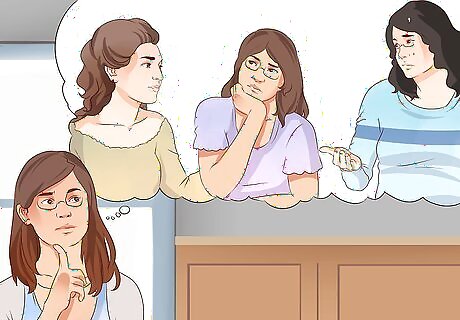
Decide if you dislike the person you are when you’re around your friend. If you feel repulsed by your friend, or if feel your chest tighten or your throat clench when you imagine them, these signs indicate the person is not a good friend for you. Does actually spending time with them make your skin crawl? If so, you may want to let the friendship end. Even if you can’t pinpoint a specific reason why your friend repels you, it’s usually best to go with your gut. Often, our instincts give us the right information even though we don’t understand the reasons completely. If your friend makes you feel passive aggressive -- or even just aggressive -- it’s time to end a friendship. The feelings you’re experiencing are best avoided by staying away from the friend who inspires them. Yelling at, accusing, and passing judgment on anyone (especially your friend) are not healthy ways to communicate. Good friends should bring out the best in us. You might also feel antagonistic toward your friend. Perhaps you hope that they do not succeed, or that they do not achieve the things they want to. These are not the things that friends wish for each other, and you should take this as an indication that now is the time to end this friendship. Do you feel the need to emphasize your friend’s flaws all the time? Do you show little empathy toward them? These tendencies indicate you do not value the friend. Stay aware of these negative, unfriendly behaviors and use them as a gauge to decide if your friendship is worth keeping.


















Comments
0 comment